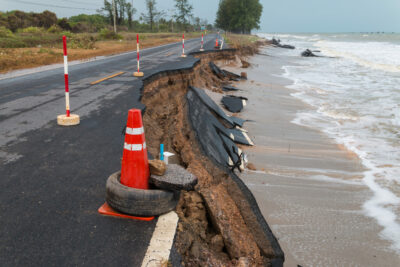See online version of eNewsletter here.

Rod Nilsestuen Legacy Event
Far-Field Effects of Sea-Level Rise:
We Are All Coastal
Wednesday, March 31, 2021
4:30 – 6:00 PM CST ● Virtual
Register Here
What is the impact of climate change on wealth transfer in the Heartland? Rising sea level has immediate and obvious impacts to the coastal United States; however, sea level and its impacts reach deep into the United States Heartland, remote from the coasts. Rising sea level induces population displacement and migration from coastal areas to the continental interior. Capital flows from the continental interior to the coastal zone represent a large transfer of public wealth from largely impoverished counties of interior states to generally more affluent counties of the coasts. This talk examines the societal impacts of that wealth transfer on continental interior communities.
Dr. Steven K. Boss
Professor of Environmental Dynamics and Sustainability
Department of Geosciences, University of Arkansas
Featured Panelists:
Randy Romanski, Secretary-Designee Wisconsin Department of Agriculture, Trade and Consumer Protection (DATCP)
Paul Dietmann, Senior Lending Specialist Compeer Financial
Rachel Bouressa, Waupaca County farmer
National Farmers Union Climate Change Policy Advisory Panel
What is the impact of climate change on wealth transfer in the Heartland? Rising sea level has immediate and obvious impacts to the coastal United States; however, sea level and its impacts reach deep into the United States Heartland, remote from the coasts. Rising sea level induces population displacement and migration from coastal areas to the continental interior. Capital flows from the continental interior to the coastal zone represent a large transfer of public wealth from largely impoverished counties of interior states to generally more affluent counties of the coasts. This talk examines the societal impacts of that wealth transfer on continental interior communities.

 A Legacy of the New Deal, Electric Cooperatives Struggle to Democratize and Make a Green Transition
A Legacy of the New Deal, Electric Cooperatives Struggle to Democratize and Make a Green Transition
By James Bruggers, Inside Climate Change
FDR program to electrify rural America is now beset by expensive coal plants and often-hidebound governing boards, as members clamor for transparency and renewables. Read more here
 Rural Power Coalition asks Congress for clean energy in Rural America
Rural Power Coalition asks Congress for clean energy in Rural America
Robert Raymond|March 1, 2021
In an attempt to influence policymakers to invest in a more efficient and sustainable grid, the Rural Power Coalition, a coalition of organizations and individuals standing in solidarity with rural electric cooperatives around the country, sent a letter to Congress last week urging them to enact a list of policies to support rural electric cooperatives across the country.
Read more here.
Six months after Great River Energy made a stunning decision to shutter its North Dakota power plant, the coal-fired behemoth’s ultimate fate is still unknown — and with it the future of a valuable power line running to the Twin Cities.
Maple Grove-based Great River will close its Coal Creek plant in 2022’s second half, becoming the first major electricity producer in the Upper Midwest to completely abandon coal.
Read more here
So, you want to retire…
Worker Co-op provides succession plan option

By TESHA M. CHRISTENSEN, Midway Como Monitor
Business owners who want to retire have two options. They can sell or just shut down.
Christina Nicholson of Nexus Community Partners (2314 University Ave. Suite 18) wants to let people know there is another exit strategy.
They can establish a worker cooperative.
Nexus works with business owners and employees to figure out if this step is right for them, and walks them through the process.
REI is a well-known business that is also a co-op. Locally, several grocery stores are set up as co-ops (including Seward Community Co-op and Mississippi Market) as is The Hub Bike Coop. As more workers want a say in their workplaces, Nicholson believes that this model will grow in popularity.
Read more here.
